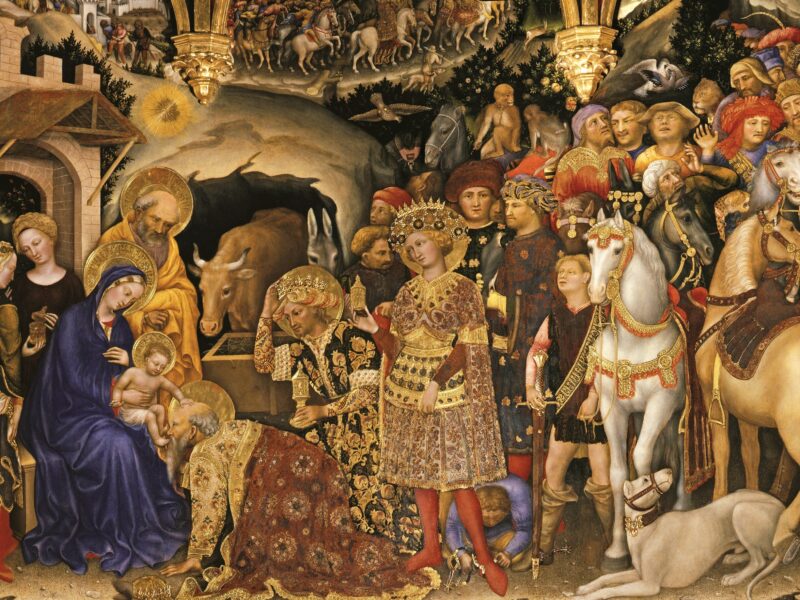I
A dry heat glowing in his shins and brain afire,
The night sky gray behind the distant münster’s spire,
He found himself awake upon a rain-slicked street,
His boot heels slipping on the stones; the wind searched every pleat
Of his brown cloak and struck his body till it spun
Him back and all his crooked pathway had undone.
He heaved himself upon his left leg, for the right
Hung numb and limp; its every joint seemed rusted tight.
What shame to seem so crippled. When he tried to stand,
He had to brace against the wind with his left hand,
Then drag himself along, leaned weakly to the wall,
Expecting with each motion of his weight to fall.
But just ahead, he saw an open college gate
And thought to reach its chapel where he’d pray and wait.
So fixed upon his pain and on the ceaseless blast
Was he that he’d not noticed as a friend walked past;
“But I must greet him now,” he thought, “before he’s gone,”
And turned with that rough jerk of the automaton
He’d much admired in the Parisian garden pool,
Its maiden form’s crude motions caused by pump and spool.
His strength was gone. He fell against the church’s wall
And would have crawled inside, but heard a friend’s voice call,
And, yes, out in the courtyard, there he stood, so kind
And warm his face, which said, “There’s someone you must find.
Monsieur N. says that he has something which you seek.”
“A melon, probably,” he thought, but could not speak;
Indeed, he could not stand, though all about, a crowd
Stood over him and wondered at his state aloud.
II
Then they were gone. He stood there, silent at his table,
Where lay a book so grand and thick he was unable
To lift it, though with much delight he turned the pages
And saw that it contained the science of all ages,
As an Encyclopedia ordered by one mind.
And just as he began to read, what should he find,
But still another book lain flat beneath his hand?
He felt worn leather rising toward the pineal gland.
He read the title stamped in gold upon its face—
The Corpus Poetarum—, turned to a marked place,
And there found an old poem that he recognized,
From his years at La Flèche, where all the boys had prized
Its simple charm: “What way in life shall I pursue?”
He broke off, seeing a man he didn’t think he knew,
A man who held a sheet of paper with a verse,
Beginning, “Yes and No,” then asked him to rehearse.
“I know that one,” he said, “it’s in this book right here,”
But searching there, he sensed the other disappear.
“My friend,” he said, “I cannot find the page I need
And now my other book’s been lost in some misdeed.”
No sooner has he spoken than, before his eyes,
The great encyclopedia on the table lies,
Though, now, he sees that whole sheets have been torn from it,
The cover stained with oils, and the spine has split.
The “Yes and No” has vanished, as has that “What Way,”
And, as he says as much, the man too fades away—
Dissolves, his stern face merging with the dusty room,
Leaving the battered and abyssal books in gloom.
Alone, he sees with clarity that this dream serves
To teach those secret methods he alone deserves.
III
Such dreams shall make him smile, when he reclines outside
In the walled garden, a small daughter at his side;
There, he will clap and clap again to make a sound
Carry across the floral hedges and rebound
Off a vine-covered corner, back into their ears.
He sends the girl to search out what faint note she hears.
She parts the vines and finds a spider web, but not
The origin of that brief mystery she sought,
And runs back to her father’s knee to laugh,
While he envisions sound as lines upon a graph.
Such dreams will hold his mind’s eye rapt, the body’s blind,
When he shares with admirers his latest find.
He buckles down a living dog and slits its breast
Revealing all that palpitates within, to test
The systole and the diastole of the moving heart,
Defining its whole function by each minute part.
Taking a pair of silver sheers, he cuts the tip
From off the heart and lets a gentle finger slip
Within to feel the muscle’s silken purse contract
And loosen, all his nerves aroused by this firm fact.
His eyes close in a focused ecstasy of pride
To taste of nature’s mechanisms from inside;
As if it were the first brush with another world,
Whose seed has cracked and tender shoot at last unfurled,
Where all obscurities dissolve and truth stands clear;
Where nature’s our possession rather than our fear;
Where even the girl once catching echoes without care,
Destined in two years’ time to die in fevered flare,
Would live on rather, and her father’s agony spare,
Into an age at once more brilliant, small, and bare.




'The Dream of Descartes' has no comments
Be the first to comment this post!